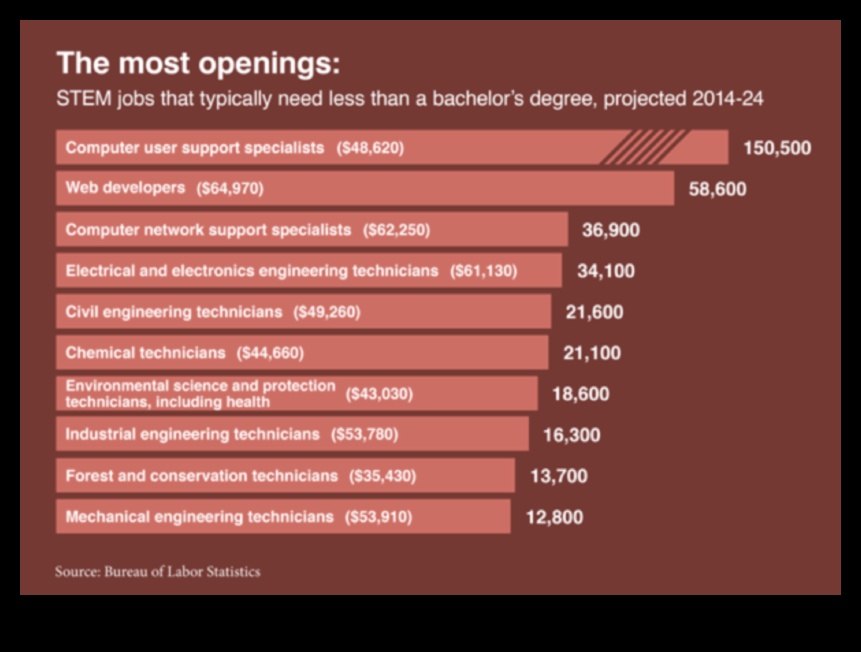
What Jobs Can You Get with an Associate’s in Science?
-
Introduction
-
What is an associate’s degree in science?
-
What are the different types of associate’s degrees in science?
-
What are the job prospects for people with an associate’s degree in science?
-
How to get an associate’s degree in science
-
Cost of an associate’s degree in science
-
Benefits of getting an associate’s degree in science
-
Disadvantages of getting an associate’s degree in science
-
FAQs
-
Conclusion
| Topic | Answer |
|---|---|
| Associate degree in science | A two-year degree that provides students with the foundation in science necessary to pursue a career in a scientific field. |
| Different types of associate’s degrees in science | There are many different types of associate’s degrees in science, including degrees in biology, chemistry, physics, and environmental science. |
| Job prospects for people with an associate’s degree in science | People with an associate’s degree in science can find jobs in a variety of fields, including healthcare, environmental science, and education. |
| How to get an associate’s degree in science | Students can earn an associate’s degree in science by attending a community college or technical school. |

II. What is an associate’s degree in science?
An associate’s degree in science is a two-year degree that provides students with a foundation in the natural sciences, such as biology, chemistry, and physics. It can also include courses in mathematics, computer science, and engineering.
An associate’s degree in science is a good option for students who want to pursue a career in a science-related field but do not want to commit to a four-year degree. It can also be a stepping stone to a bachelor’s degree in science.
III. What are the different types of associate’s degrees in science?
There are a variety of different associate’s degrees in science available, each of which focuses on a specific area of study. Some of the most common types of associate’s degrees in science include:
- Associate of Arts in Science (A.A.S.)
- Associate of Science in Engineering (A.S.E.)
- Associate of Science in Nursing (A.S.N.)
- Associate of Science in Business (A.S.B.)
- Associate of Science in Computer Science (A.S.C.S.)
Each of these degrees typically takes two years to complete and provides students with the knowledge and skills they need to pursue a career in a specific field of science.
For example, an A.A.S. in Science may prepare students for careers in environmental science, health science, or criminal justice. An A.S.E. in Engineering may prepare students for careers in civil engineering, mechanical engineering, or electrical engineering. An A.S.N. in Nursing may prepare students for careers as registered nurses. An A.S.B. in Business may prepare students for careers in business administration, accounting, or marketing. An A.S.C.S. in Computer Science may prepare students for careers as software engineers, web developers, or database administrators.
When choosing an associate’s degree in science, it is important to consider your interests and career goals. If you are not sure what you want to do with your degree, you may want to consider a general degree such as an A.A.S. in Science. This type of degree will provide you with a broad foundation in science and will allow you to transfer to a four-year college or university to complete a bachelor’s degree.
II. What is an associate’s degree in science?
An associate’s degree in science is a two-year degree that provides students with a foundation in the natural sciences, such as biology, chemistry, and physics.
Associate’s degrees in science are typically offered at community colleges and technical colleges. They are designed to prepare students for careers in a variety of science-related fields, such as environmental science, medical technology, and veterinary technology.

5. How to get an associate’s degree in science
There are a few different ways to get an associate’s degree in science. The most common way is to attend a community college or technical school. Community colleges offer affordable two-year degrees that can be completed in as little as two years. Technical schools offer more specialized degrees that can be completed in one year or less.
Another way to get an associate’s degree in science is to transfer from a four-year college or university. If you have already completed some college coursework, you may be able to transfer to a community college and complete your associate’s degree in science in one year.
Finally, you can also earn an associate’s degree in science through a distance-learning program. Distance-learning programs allow you to complete your degree coursework online, at your own pace.
No matter how you choose to earn your associate’s degree in science, it is important to make sure that the program is accredited by a recognized accrediting agency. This will ensure that the degree you earn is recognized by employers and other institutions of higher education.
I. Introduction
An associate’s degree in science is a two-year undergraduate degree that provides students with a foundation in the natural sciences, such as biology, chemistry, and physics. Associate’s degrees in science are typically offered at community colleges and technical colleges.
II. What is an associate’s degree in science?
An associate’s degree in science is a two-year undergraduate degree that provides students with a foundation in the natural sciences, such as biology, chemistry, and physics. Associate’s degrees in science are typically offered at community colleges and technical colleges.
III. What are the different types of associate’s degrees in science?
There are a variety of different types of associate’s degrees in science, including:
- General associate’s degree in science
- Associate’s degree in biology
- Associate’s degree in chemistry
- Associate’s degree in physics
- Associate’s degree in environmental science
- Associate’s degree in geology
- Associate’s degree in mathematics
- Associate’s degree in computer science
IV. What are the job prospects for people with an associate’s degree in science?
The job prospects for people with an associate’s degree in science are good. According to the Bureau of Labor Statistics, the median annual salary for scientists and engineers is $88,420.
V. How to get an associate’s degree in science
To get an associate’s degree in science, you will need to complete the following steps:
- Earn a high school diploma or equivalent.
- Apply to a community college or technical college that offers an associate’s degree in science.
- Complete the required coursework for your degree.
- Pass the required exams.
- Complete a capstone project or thesis.
VI. Cost of an associate’s degree in science
The cost of an associate’s degree in science will vary depending on the school you attend. The average cost of tuition and fees at a community college is around $3,000 per year.
VII. Benefits of getting an associate’s degree in science
There are many benefits to getting an associate’s degree in science, including:
- A higher salary potential
- More job opportunities
- A better understanding of the natural world
- The ability to solve problems
- Critical thinking skills
- Communication skills
- Leadership skills
VIII. Disadvantages of getting an associate’s degree in science
There are a few disadvantages to getting an associate’s degree in science, including:
- It may not be enough for some jobs
- It may take longer to get a bachelor’s degree
- It may be more expensive than a bachelor’s degree
IX. FAQs
Here are some frequently asked questions about associate’s degrees in science:
- What is the difference between an associate’s degree in science and a bachelor’s degree in science?
- What are the best jobs for people with an associate’s degree in science?
- How long does it take to get an associate’s degree in science?
- How much does it cost to get an associate’s degree in science?
- What are the benefits of getting an associate’s degree in science?
- What are the disadvantages of getting an associate’

VII. Benefits of getting an associate’s degree in science
There are many benefits to getting an associate’s degree in science. Some of the benefits include:
- A higher starting salary
- More job opportunities
- Better job security
- Increased earning potential
- More flexibility in your career
- A better understanding of the scientific world
- A foundation for further education
If you are considering a career in science, an associate’s degree can be a great way to get started. It can provide you with the skills and knowledge you need to succeed in a variety of science-related jobs.

Disadvantages of getting an associate’s degree in science
There are a few disadvantages to getting an associate’s degree in science. These include:
- An associate’s degree in science is not as comprehensive as a bachelor’s degree. This means that you may not have the same level of knowledge and skills as someone with a bachelor’s degree in science.
- An associate’s degree in science may not qualify you for some jobs that require a bachelor’s degree.
- An associate’s degree in science may take longer to complete than a bachelor’s degree. This is because you will need to take more classes to earn your degree.
- An associate’s degree in science may be more expensive than a bachelor’s degree. This is because you will need to pay for more classes.
It is important to weigh the pros and cons of getting an associate’s degree in science before making a decision. If you are not sure whether an associate’s degree is right for you, it may be a good idea to talk to a career counselor or advisor.
IX. FAQs
Here are some frequently asked questions about associate’s degrees in science:
-
What is the difference between an associate’s degree in science and a bachelor’s degree in science?
-
What are the job prospects for people with an associate’s degree in science?
-
How long does it take to get an associate’s degree in science?
-
What is the cost of an associate’s degree in science?
-
What are the benefits of getting an associate’s degree in science?
-
What are the disadvantages of getting an associate’s degree in science?
FAQs
Q: What are the job prospects for people with an associate’s degree in science?
A: There are a variety of job prospects for people with an associate’s degree in science. Some of the most common jobs include:
* Lab technician
* Research assistant
* Science teacher
* Environmental scientist
* Medical assistant
* Pharmaceutical technician
* Data analyst
* Quality control inspectorQ: What are the benefits of getting an associate’s degree in science?
There are many benefits to getting an associate’s degree in science, including:
* It can help you get a job in a variety of science-related fields.
* It can prepare you for a bachelor’s degree in science.
* It can give you the skills you need to succeed in a STEM career.
* It can help you develop your critical thinking and problem-solving skills.
* It can open up opportunities for lifelong learning.Q: What are the disadvantages of getting an associate’s degree in science?
There are a few disadvantages to getting an associate’s degree in science, including:
* It may not be enough education for some jobs in science.
* It may not be as well-respected as a bachelor’s degree.
* It may take longer to complete than a bachelor’s degree.
* It may be more expensive than a bachelor’s degree.